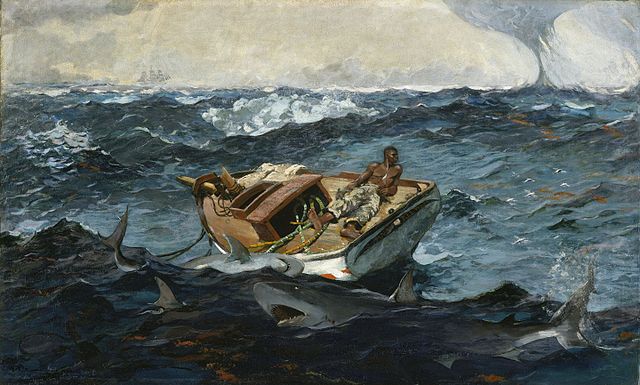
“Art is immortal and weighs heavily on us,
and museums leave us at a loss for words.
Outside becomes a museum: its ornate frames
square off a dome, a few trees, a brace of sparrows;
till every view is a postcard signed by great names:
that sky Canaletto’s, that empty bench Van Gogh’s.
I ground out my butt and re-entered the dead air,
down the echoing marble with its waxed air
of a pharaonic feast. Then round a corridor
I caught the light on green water as salt and clear
as the island’s. Then I saw him. Achille! Bigger
than I remembered on the white sun-splintered deck
of the hot hull. Achille! my main man, my nigger!
circled by his chain-sawing sharks; the ropes in his neck
turned his head towards Africa in The Gulf Stream,
which luffed him there, forever, between our island
and the coast of Guinea, fixed in the tribal dream,
in the light that entered another Homer’s hand,
its breeze lifting the canvas from the museum.
But those leprous columns thudding against the hull
where Achille rests on one elbow always circle
his craft and mine, it needs no redemptive white sail
from a sea whose rhythm swells like Herman Melville.
Heah’s Cap’n Mellville on de whiteness ob de whale–
“Having for the imperial colour the same imperial hue . . .
giving the white man ideal mastership over every dusky tribe.”
Lawd, Lawd, Massa Melville, what could a nigger do
but go down dem steps in de dusk you done describe?
So I stood in the dusk between the Greek columns
of the museum touched by the declining sun
on the gilt of the State House dome, on Saint Gauden’s
frieze of black soldiers darkening on the Common,
and felt myself melting in their dusk. My collar
turned up in a real freeze, I looked for a cab,
but cabs, like the fall, were a matter of colour,
and several passed, empty. In the back of one, Ahab
sat, trying to catch his whaler. I looped a shout
like a harpoon, like Queequeg, but the only spout
was a sculptured fountain’s. Sic transit taxi, sport.
Streetlights came on. The museum windows went out.
–from Omeros by Derek Walcott
In Chapter XXXVI the narrator visits an art museum and sees, among other works, Winslow Homer’s Gulf Stream. This might possibly be my favorite episode so far. I love the word play, the other Homer whose painting gives Walcott a visual image for his reinterpretation of Homer’s Iliad, his black Achille.
I love the consideration of art, painting, sculpture, and the way when you leave the museum your eyes want to reframe the whole world as art. It’s a phenomenon I’ve noticed myself so many times, including the most recent visit to the Museum of Fine Arts in Boston. I snap so many photos as we are leaving the museum, trying to frame the world, to capture the artistry of it: the line of columns, the children all sitting in a row, the light on a tree.
It’s interesting how the narrator seems to step out of the museum where he’s seen The Gulf Stream right onto Boston Common. It’s a dreamlike conflation of place. The Gulf Stream isn’t even in Boston– unless Walcott saw it when it was visiting for a special exhibition– it hangs in the Metropolitan Museum in New York. But even if the painting had been in the MFA, the museum is a good forty minute walk from the Common, or a ten minute drive. Yet in the poem narrator-Walcott stands between the columns outside the museum (flanked by the columns as the figure in the painting is flanked by the shark) and gazes on the State House and the Robert Gould Shaw memorial so that he can orchestrate this beautiful juxtaposition with the Winslow Homer painting, the black soldiers and the missed cab. And then he brings in Melville and the white whale to round out his consideration of race and art, whiteness and blackness, the museum and the sea.
It’s all so very lovely and postmodern. Where Dante is merely in his poem as protagonist and narrator, Walcott is both the protagonist and the author meditating on the act of creation and fully aware of all the implications and possibilities of being represented in his own work.
When I get to the frieze/freeze pun and Ahab in the taxicab I wanted to stand up and cheer (but that would have been a bit funny in the doctor’s office). And then I start to wonder if there’s an implied pun in “gilt” and is there a double meaning in his turned up collar as there was in the canvas the breeze was lifting from the museum.
I really wanted to post the whole chapter because there are some delightful moments earlier on as Walcott contemplates art, death, history, nature and decay.

